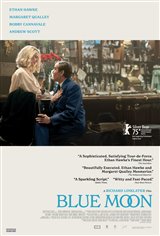Blue Moon - True Story
Richard Rodgers and Lorenz Hart
Their 1927 Broadway hit A Connecticut Yankee was turned into a movie in 1931 starring Will Rogers. Babes in Arms (1937) featured standards such as “My Funny Valentine” and “The Lady Is a Tramp.” It became a hit movie starring Mickey Rooney and Judy Garland.
Opening on Broadway in 1938, The Boys from Syracuse was the first musical based on a Shakespeare play, The Comedy of Errors.
I Married an Angel (1938) was adapted into a film in 1942 starring Jeannette Macdonald and Nelson Eddy.
Pal Joey (1940): Known for its darker themes and songs like "Bewitched, Bothered and Bewildered," it was made into a movie in 1957 starring Frank Sinatra and Rita Hayworth.
Their final original show, By Jupiter, which debuted on Broadway in 1942, was their longest-running collaboration.
Many of their shows introduced songs that became standards of the American songbook, cementing Rodgers and Hart’s influence on musical theatre history.
Richard Rodgers' first major project wihout Hart was his legendary hit musical musical Oklahoma! Hart, who was struggling with alcoholism and depression, declined to work on Oklahoma! because he felt unable to write for a story set in rural Oklahoma and was in a personal decline at the time.
Despite their professional split, Hart attended the opening night of Oklahoma! in 1943. Multiple accounts suggest that, at least publicly, Hart was gracious about Rodgers’s triumph: he reportedly "pushed his way through the crowd at the after-show party in Sardi's restaurant and threw his arms around his ex-partner, grinning from ear to ear. He told Rodgers he had never had a better evening at the theater in his life." According to some versions, Hart applauded enthusiastically from the audience and congratulated Rodgers, saying, "This show of yours will run forever." However, others close to Hart believed his true emotions were far more complicated, with his sister-in-law later recalling that although he attended, he didn’t actually like the show but didn’t want to disappoint Rodgers by saying so.
The event marked both a triumph and a turning point: while Rodgers moved forward with Oscar Hammerstein II in a groundbreaking new partnership, Hart’s health and spirits declined rapidly, and he died later that year. The success of Oklahoma! was both a professional breakthrough for Rodgers and, for Hart, a bittersweet moment of loss and separation from his longtime creative partner.
